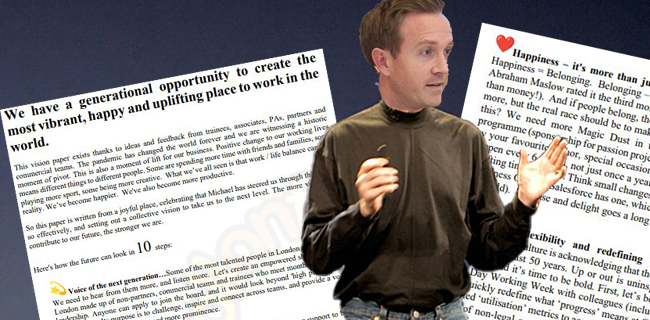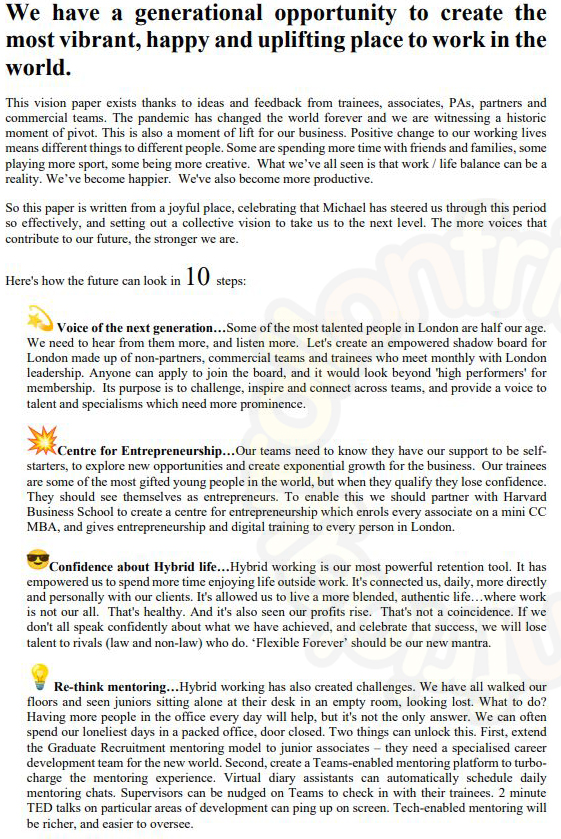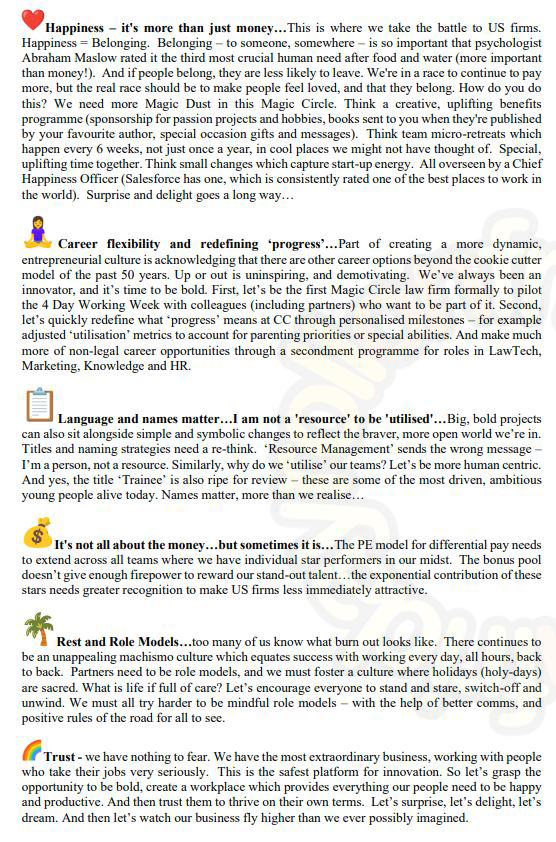
![]() One more thing
One more thing
A candidate to become the next Managing Partner of Clifford Chance has submitted a 'vision paper' in which he claims the firm can become the "most vibrant, happy and uplifting place to work in the world".
Jonathan Kewley, 40, is the co-head of the firm's tech practice and appears to have drawn inspiration from his Silicon Valley clients. Each of the ten steps of his plan, which is written "from a joyful place", is punctuated with an emoji, and brims with the kind of weapons-grade enthusiasm more often associated with the launch of a smartwatch than a bid to manage a law firm.
His manifesto converts verbs into nouns in the style of a tech visionary, describing how the pandemic means "we are witnessing a historic moment of pivot" which "is also a moment of lift for our business".
According to Kewley, who is facing off against incumbent Michael Bates, the pandemic has meant "we've become happier", which may come as a surprise to anyone who's been depressed in their flat for two years, or died.
His focus on the upsides of Covid may be lost on associates enduring punishing hours in CC's structured finance team, but his ideas for the future will be welcomed as a conversation starter, at the very least.
Kewley argues that hybrid working has "allowed us to live a more blended, authentic life" and is the firm's "most powerful retention tool". He proposes a new mantra for the firm, "Flexible Forever", which is likely to appeal to young lawyers in favour of a better work/life balance and older colleagues seeking to stay limber.
US firms frequently tempt lawyers away from the Magic Circle with larger salaries and bonuses, but the CC partner has a plan to combat their raids. Happiness is "more than just money", and "this is where we take the battle to US firms", he writes.
"Happiness = Belonging", explains Kewley. "We're in a race to continue to pay more, but the real race should be to make people feel loved, and that they belong. How do you do this? We need more Magic Dust in this Magic Circle".
Kewley's 'Magic Dust' includes unique benefits such as "sponsorship for passion projects and hobbies" and books "sent to you when they're published by your favourite author", as well as team "micro-retreats" which happen "in cool places we might not have thought of".
"Think small changes which capture start-up energy", enthuses the partner, "All overseen by a Chief Happiness Officer".
Kewley concedes that "sometimes it is" about the money, and so the firm also needs to be able to award larger bonuses to star performers "to make US firms less immediately attractive".
Junior associates could benefit from "2 minute TED talks" which pop up on their computer screens, suggests Kewley, and the firm should also partner with Harvard Business School so every associate can be enrolled on a "mini CC MBA". That idea is punctuated with an explosion emoji, neatly capturing the reaction of partners when they're asked to fund a course to convert their workhorses into independent-minded entrepreneurs.
A Clifford Chance lawyer told RollOnFriday the manifesto was "hilarious" and "deranged", so it's already made at least one of them happier. Another source at the firm suggested that Kewley's vision was a positive example of how an open culture at Clifford Chance allowed space for different voices.
Standing atop his metaphorical desk, Kewley's vision climaxes with a stirring call for action that wouldn’t be amiss in an airline advert: "Let’s surprise, let’s delight, let’s dream. And then let’s watch our business fly higher than we ever possibly imagined".
Share the vision: ![]()
![]()
![]()
















Comments
53
35
Fantastic
68
30
Dear sweet, tiny, infant, baby Jesus...
62
27
Question is, will partners drink the Kewl-Aid?
57
35
The document is in times new roman.
Excellent article. Made my morning.
71
38
How can anyone read this and not immediately want to expel the comments of their stomach through their mouths?
On a separate note, very easy for a partner gunning for the top spot to say "happiness is more important than money!" from their mansion in leafy Primrose Hill.
53
34
Good on him - aim high, fail high and all that.
47
40
Simply brilliant and one all firms and all organisations should aspire to!
51
29
Jesus, Mary, Joseph and the wee donkey!
55
34
All sounds good in principle but when you try to run a business by democracy and encourage everyone to have a voice, you will end up with a 'shadow board' of individuals who have no leadership or commercial experience, telling you how you should run your business. I've seen it happen in the public sector where the drive for recognising every individual ended up creating a place where you had very vocal committees and self serving interest groups all vying for the institution to bend to their vision of how it should be run. This completely decimated the existing culture because there was dominant or overriding strategy/vision that everyone got on board with. It ended up being a collection of these special interest groups having large amounts of face time with senior leadership lobbying for changes to be made that would affect the majority for the sole benefit of their group. Anyone who wasn't part of these groups was left feeling disengaged and confused.
Young people may be talented but they have no wisdom and tend to be (not all the time but particularly the most vocal) politically motivated which is bad for business as what may be politically acceptable or morally virtuous today, tends to have a short shelf life. I think it was HSF who recently had issues with young associates telling the firm not to work with particular clients that were not favourable to them ignoring the very thing that a law firm exists to do which is to provide a service and make money.
63
29
In our time, corporate speech and writing are largely the defence of the indefensible. Things like the continuance of 100-hour weeks, the ceaseless emails, the lack of empathy from partners, can indeed be defended, but only by arguments which are too brutal for most people to face, and which do not square with the professed aims of law firms. Thus corporate language has to consist largely of euphemism, question-begging and sheer cloudy vagueness. Defenceless associates are bombarded by email, their family life driven out of sight, their erstwhile hopes for a fulfilling and rich career destroyed by stress: this was called utilisation. Millions of lawyers are robbed of their youth and sent trudging along the roads with grey hair and unhappy families: this was called maintaining a busy and varied practice. Now, people will remain imprisoned for years by their target hours, stripped of the confidence to believe that another life is possible: this will be called leveraging human-centric deliverables . Such phraseology is needed if one wants to name things without calling up mental pictures of them.
70
38
I was expecting the memo to be nonsense but I've had to check my cynicism - I actually think this is really good. Good on him. By the way, don't think I ever previously read a manifesto for Managing Partner of any firm, including CC where I worked a number of years. Well done him for setting out an actual clear vision.
33
43
I agree Jonathan, it’s got a lot of good stuff in it.
30
27
LOL!
41
28
howdoyoudofellowkids.jpg
39
29
Hilarious.
Needed more emojis.
Imagine if he kept a straight face while drafting that document.
40
27
He would have more credibility if people in he applied his ‘philosophy’ to people in his own team.
59
28
"the drive for recognising every individual ended up creating a place where you had very vocal committees and self serving interest groups all vying for the institution to bend to their vision of how it should be run. This completely decimated the existing culture because there was dominant or overriding strategy/vision that everyone got on board with. It ended up being a collection of these special interest groups having large amounts of face time with senior leadership lobbying for changes to be made that would affect the majority for the sole benefit of their group. Anyone who wasn't part of these groups was left feeling disengaged and confused"
Wish I could upvote this about a dozen times.
A genuinely brilliant description of the negative effect of the modern 'diversity over all' mindset. That's exactly why it's so toxic.
You end up in a committee culture with no ability to unite around a central vision or mission. You get obligated to listen to people based on their gender/ethnicity/religion/sexuality/whatever and not because they actually have anything useful to say. The organisation must be 'accessible', so even fools have to be invited to the top table, indulged like great minds, and asked how more fools can be encouraged to come along next time.
So it inevitably all disintegrates into special pleadings groups squabbling for recognition, perks and freebies, with a small number of (often mediocre) individuals burnishing their own careers by making 'diversity stuff' one of their core duties, as if it had any relevance to their performance at their actual job (or, worse still, they manage to make that kind of busywork their entire job, and then appoint a whole department of DE&I drones to do the same thing).
For those people it's great, but everyone who isn't part of the jamboree feels drained and undermined by the constant new initiatives, the cannibalisation of equal opportunity in order to feed and mollify the belligerent special interests groups regardless of personal performance, the increasingly obscure grievances they are asked to cater to, and the fact that the organisation's core purpose seems to have become secondary to the mission to make the organisation accessible.
I know, I know, it's all for a noble cause, but it's a slow death for organisations that end up literally inviting the lunatics to take over the asylum.
37
34
It's a mixture of nonsense with some really excellent ideas. (He's totally right, for instance, on the title 'trainee', which should have been killed a long time ago, and the shadow board idea would have helped at firms like Slaughters and CC with a massive disconnect between the leadership and the firm.)
50
27
He’s right that a sense of belonging is more important than money. I’m excited to hear from Jonathan’s associates how much of his £1.85m pep from last year he gifted each of them in the form of books, trips and management courses so they could live his truth.
29
26
You complete me.
27
28
This ...
"You end up in a committee culture with no ability to unite around a central vision or mission. You get obligated to listen to people based on their gender/ethnicity/religion/sexuality/whatever and not because they actually have anything useful to say. The organisation must be 'accessible', so even fools have to be invited to the top table, indulged like great minds, and asked how more fools can be encouraged to come along next time.
So it inevitably all disintegrates into special pleadings groups squabbling for recognition, perks and freebies, with a small number of (often mediocre) individuals burnishing their own careers by making 'diversity stuff' one of their core duties, as if it had any relevance to their performance at their actual job (or, worse still, they manage to make that kind of busywork their entire job, and then appoint a whole department of DE&I drones to do the same thing).
For those people it's great, but everyone who isn't part of the jamboree feels drained and undermined by the constant new initiatives, the cannibalisation of equal opportunity in order to feed and mollify the belligerent special interests groups regardless of personal performance, the increasingly obscure grievances they are asked to cater to, and the fact that the organisation's core purpose seems to have become secondary to the mission to make the organisation accessible.
I know, I know, it's all for a noble cause, but it's a slow death for organisations that end up literally inviting the lunatics to take over the asylum."
18
24
Kewley by name, so kewl by nature 😎
19
31
It may as well read 'blah, blah, blah, blah'. Did anyone at CC read the doc in full?
And they get holidays? Jeez!
Enforced happiness. Are dissidents (those who are not permanently smirking or missing billing targets) executed with flak guns?
19
23
This is a good idea. I therefore expect it is being roundly pooh-poohed in the comments above, which I haven't read yet.
16
16
I've got something that you can Surprise And Delight right, here.
12
20
He's gone full Jerry Maguire.
21
19
If Kewley gets in, he will go the same way as Sacha Romanovitch at Grant Thornton. You try to make a good place to work with diversity and inclusion and the public school breadhead bastards shit all over it and kick you out. Making your business good for the human beings who work there is "socialist" apparently (not quite sure why that is supposed to be a bad thing, anyway).
https://www.theguardian.com/business/2018/oct/15/sacha-romanovitch-leave-accountancy-firm-grant-thornton
14
14
Show me the money, Jerry.